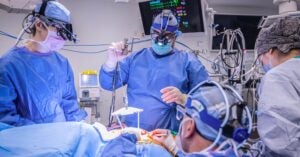A woman who received a kidney transplant from a gene-edited pig, along with an implanted device to keep her heart beating, has passed away, her surgeon announced Tuesday.
Lisa Pisano, suffering from severe kidney and heart failure, underwent two significant surgeries at NYU Langone Health in April. Initially, Pisano appeared to be recovering well, but after 47 days, doctors had to remove the pig kidney due to damage caused by her heart medications, and she was placed back on dialysis. Despite the dialysis and the heart pump, Pisano entered hospice care and died Sunday, according to Dr. Robert Montgomery, the NYU Langone transplant surgeon.
“Lisa helped bring us closer to realizing a future where someone does not have to die for another person to live,” Montgomery stated. “She will forever be remembered for her courage and good nature.”
In an April interview with The Associated Press, the 54-year-old Pisano acknowledged the risks involved but expressed hope that her participation could benefit others.
“I just took a chance. And you know, worst case scenario, if it didn’t work for me, it might have worked for someone else,” she said to that publication.

Pisano was the second patient to receive a kidney from a gene-edited pig. The first, Richard “Rick” Slayman, received his transplant at Massachusetts General Hospital and died nearly two months later in early May. His doctor indicated that his death was due to preexisting heart disease and not the transplant.
Currently, more than 100,000 people in the U.S. are on the transplant waiting list, most of whom need a kidney, and thousands die while waiting. To address this shortage, several biotech companies are working on genetically modifying pigs to make their organs more compatible with humans and less likely to be rejected by the immune system.
In addition to the pig kidney transplants, the University of Maryland has transplanted pig hearts into two men who had no other options; both men died within months.
Despite these outcomes, the knowledge gained from these attempts and ongoing research with donated bodies has encouraged doctors to hope for the beginning of formal clinical trials next year involving patients who are not as critically ill.


